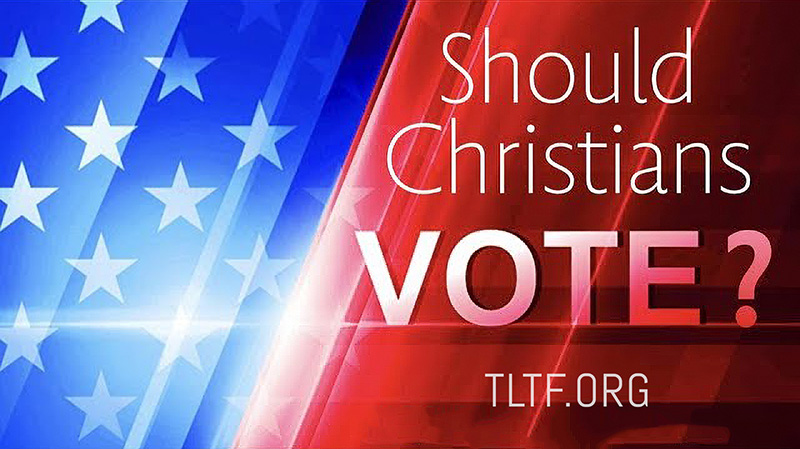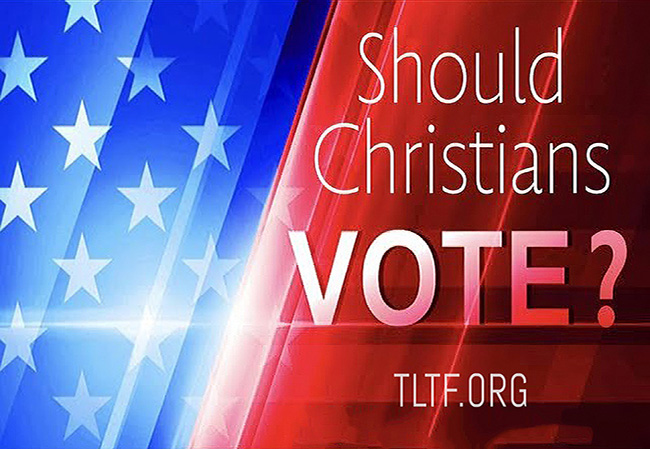
There is a debate among Christians about voting. Some claim we have a moral responsibility to vote, while others see voting as a purely political act, which Christians should forgo. Those who oppose it will sometimes point to Jesus’ nonviolent lifestyle and his apparent lack of interest in politics, and conclude that somehow, he was “non-political.” I could not disagree more.
Jesus’ message throughout his time on earth was “the kingdom of God.” Many read this and interpret it as ‘the family of God,’ but did Rome? Or the people of Israel? There is little doubt that Rome took it seriously. In fact, it was one of the key issues Pilate asked Jesus at his trial. “Are you the king of the Jews?” The people of Israel were almost fixated on the prophecies of the promised Messiah coming as a conquering king. So much so that on the day of his ascension into heaven, even his apostles asked him whether he was going to “restore the kingdom of Israel.” During the millennial period, Jesus will reign as king over all the earth! So, Jesus is certainly “political.”
Some point to the confrontation between the Pharisees and Jesus about paying taxes (Matthew 22:15-23) as some kind of life lesson on being involved in politics. I think they miss the point. The Pharisees attempted to make it a taxation issue. Jesus showed them the issue was and remains one of loyalties. All of us are subject to some form of political system; be it a republic, democracy, communism, or a monarch. Regardless of which system is in place, Jesus demonstrated that we should work within that system, giving to Caesar what is Caesar’s, while never giving our heart to anyone other than God.
In a sense, voting is something that ‘belongs to Caesar.’ Our nation provides a mechanism by which we, the people, select our leaders. Therefore, using Jesus’ example of working within the framework of your political system, we should vote. Voting is simply making a choice. Nothing more.
Another misguided belief which fuels the “no voting” group is that the future is fixed by God and cannot be altered by man. I don’t agree with this conclusion. Most of life, even for Christians, comes about through our free choices, not providence or predestination. We marry, work, eat, sleep, go to church, read, pray, etc., based on our own choices. If you truly believed that all of life, for every person, is eternally fixed by God, then you would do none of these things. You wouldn’t decide whom to marry, where to work, what to eat, etc. You would be nothing more than a spectator of your own existence. All of life would simply happen to you, with or without your input. Logic and life tell us that the idea of God’s control of everything is grossly exaggerated and, in fact, unbiblical. (For further exploration, I recommend the books Don’t Blame God and God of the Possible).
Proverbs 29:2 (REV)
“When the righteous increase, the people rejoice, but when a wicked person rules, the people groan.”
Wicked rulers (those who are not aligned with the kingdom of God ideals) cause groans of pain for people. They burden them with ungodly laws which are contrary to God’s laws. As Christians, we have a duty to our Lord Jesus Christ to make disciples of all men and to pray for our leaders so we may lead quiet and peaceable lives. One of the ways we can secure those blessings for ourselves, and future generations, is to cast a vote. It is the “coin” we have been given by our government, and if we do not cast our vote, we are in effect giving our vote to the wicked ruler.
The political system Jesus declared was the kingdom of God, which he demonstrated and defined throughout his earthly ministry. It is one filled with peace, prosperity, and justice. If these were the characteristics of a political system Jesus promoted, doesn’t it make sense to vote for the platform that most aligns with Jesus’ ideal kingdom?
I’m reminded of Joshua’s final words to the children of Israel before his death.
Joshua 24:15 (REV)
“But if it seems evil in your eyes to serve Yahweh, choose this day whom you will serve, whether the gods that your fathers served that were beyond the Euphrates River or the gods of the Amorites in whose land you live. But as for me and my house, we will serve Yahweh.”
Clearly Joshua was calling the people to make the right choice. The choice… the right to choose was theirs alone. Likewise, we Americans have a choice, and we cannot take it lightly. In a few days, we the people of the United States of America will have the opportunity to cast our vote for the next President and numerous federal, state, and local authorities. Millions, if not billions of people in other nations have no such right. Their leaders are appointed or selected by powers other than the will of the people. We should be thankful that we have such a right. We, like Israel, have a choice to make. Let us make it wisely, with loyalty to our Father God, our Lord Jesus, and humanity’s future in our sights.
Your Brother in Christ,![]()

